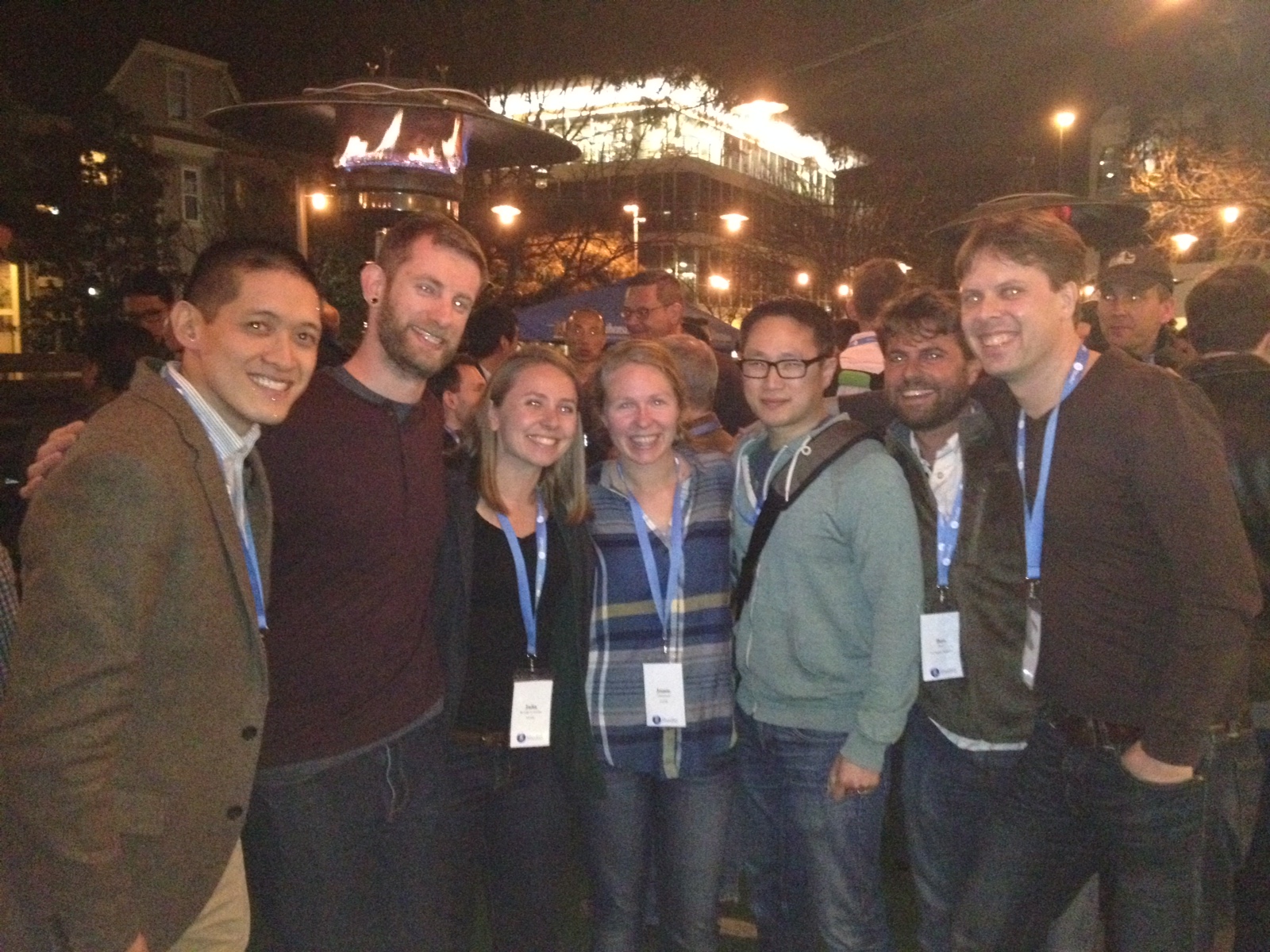joining
Ben Best
January 29, 2016
Precursors
RStudio Heroes
Last weekend at 1st annual shinydevcon. Left to right, @github (affiliation):
- Winston Chang @wch (RStudio)
- Hadley Wickham @hadley (RStudio)
- Julie Lowndes @jules32 (OHI)
- Jamie Afflerbach @jafflerbach (OHI)
- Joe Cheng @jcheng5 (RStudio)
- Ben Best @bbest (OHI)
- Herman Strop @FrissAnalytics (FrissAnalytics)

Brought some of these stickers for ya:
RStudio Shortcuts
- rstudio-IDE-cheatsheet.pdf
- Show Keyboard Shortcuts
?: Alt+Shift+K (Win), Option+Shift+K (Mac) - (Un)Comment lines
#: Ctrl+Shift+C (Win), Cmd+Shift+C (Mac) - Insert
%>%: Ctrl+Shift+M (Win), Cmd+Shift+M (Mac) - Attempt completion: Tab or Ctrl+Space (Win), Tab or Cmd+Space (Mac),
- Knit Document: Ctrl+Shift+K (Win), Cmd+Shift+K (Mac)
- Copy Lines Up/Down: Shift+Alt+\(\uparrow\)/\(\downarrow\) (Win), Cmd+Option+\(\uparrow\)/\(\downarrow\) (Mac)
- Show Keyboard Shortcuts
New Assignment Github Workflow
OLD
So far to turn in individual assignments, you’ve been editing env-info/students/<user>.Rmd and knitting to env-info/students/<user>.html. Then you push to your repo <user>/env-info before submitting to the course repo ucsb-bren/env-info with a push, and pull request. To update your <user>/env-info with the latest from ucsb-bren/env-info, you also need to do an additional pull request, merge, and pull.
| repo location | <user> permission |
initialize | edit | update |
|---|---|---|---|---|
github.com/ucsb-bren/env-info |
read only | merge [BB] | ||
github.com/<user>/env-info |
read + write | fork | pull request | pull request , merge |
~/localdir/<user>.github.io |
read + write | clone | commit , push | pull |
NEW
For future assignments, you’ll use a much simpler Github workflow with less possibilities for merge conflicts:
| repo location | <user> permission |
initialize | edit | update |
|---|---|---|---|---|
github.com/<user>/<user>.github.io |
read + write | create | ||
~/localdir/<user>.github.io |
read + write | clone | commit , push | pull |
Similar to your class group project repo <org>/<org>.github.io which serves a web site at http://<org>.github.io, you want to initialize:
Create a repository
<user>/<user>.github.iowhere you’ll replace<user>with your Github username (eg I created a repositorybbest.github.ioin whichbbestis the owner). If you already have this repository created, you can simply move on. Otherwise, please also tick the box to initialize this repository with a README.Go to Settings, Collaborators and add
bbestandnaomitagueas collaborators. This will give us write permissions on your repository, enabling us to more easily help you fix code.Run the equivalent of
git clone http://github.com/<user>/<user>.github.iofrom RStudio menu File, New Project…, Version Control, Git.Create a new folder
env-info_hwinside your local repository<user>.github.io.
It is important that you use the exact spelling for all of the above. Otherwise, we won’t be able to find your homework.
Individual Assignment wk05_ggplot
Now, for every week’s assignment you’ll create a new Rmarkdown file inside the env-info_hw folder of your <user>.github.io repo. This week create one called wk05_ggplot.Rmd with File, New File…, R Markdown…
We’ll be able to grade assignments, because we have a roster of students by Github username, and so presume we’ll find your assignment by visiting http://<user>.github.io/env-info_hw/wk05_ggplot.html, eg http://bbest.github.io/env-info_hw/wk05_ggplot.html.
Again, it is important that you use the exact spelling above. Otherwise, we won’t be able to find your homework.
joining data
For this portion of the individual assignment, similar to last week, you’ll find it easiest to copy and paste from ## joining data onwards in env-info/wk05_joining.Rmd to your <user>.github.io/env-info_hw/wk05_ggplot.Rmd. Then you can play with different chunks of the code. Please be sure to answer all tasks and questions at the bottom.
The R chunks explaining the dplyr join functions below are pulled from the excellent wrangling-webinar.pdf presentation, which you should consult as you execute (see shortcuts in rstudio-IDE-cheatsheet.pdf).
setup
Ensure that you’re in the same working directory env-info_hw when you Knit HTML as when you test code in the Console.
wd = 'env-info_hw'
# set working directory for Console (vs Rmd)
if (wd %in% list.files() & interactive()){
setwd(wd)
}
# ensure working directory
if (basename(getwd()) != wd){
stop(sprintf("WHOAH! Your working directory is not in '%s'!\n getwd(): %s", wd, getwd()))
}bind_cols
bind columns between data frames
library(readr)
library(dplyr)
y = read_csv(
'x1,x2
A,1
B,2
C,3')
z = read_csv(
'x1,x2
B,2
C,3
D,4')
y
z
bind_cols(y, z)bind_rows
bind rows of data frames
y
z
bind_rows(y, z)union
set operation on data frames, returning all unique rows
y
z
union(y, z)intersect
set operation on data frames, returning those rows in common
y
z
intersect(y, z)setdiff
set operation on data frames, returning all mismatched rows
y
z
setdiff(y, z)left_join
return all rows from x, and all columns from x and y. Rows in x with no match in y will have NA values in the new columns.
artists = read_csv(
'name,plays
George,sitar
John,guitar
Paul,bass
Ringo,drums')
songs = read_csv(
'song,name
Across the Universe,John
Come Together,John
"Hello, Goodbye",Paul
Peggy Sue,Buddy')
artists
songs
left_join(songs, artists, by='name')inner_join
return all rows from x where there are matching values in y, and all columns from x and y
inner_join(songs, artists, by = "name")semi_join
return all rows from x where there are matching values in y, keeping just columns from x
semi_join(songs, artists, by = "name")anti_join
return all rows from x where there are not matching values in y, keeping just columns from x
anti_join(songs, artists, by = "name")per capita CO2 emissions
You’ll join the population dataset to calculate per capita CO2 emissions.
Task. Calculate the per capita emissions by country (not World or EU28) and return the top 5 emitting countries for 2014.
Task. Summarize the per capita emissions by country (not World or EU28) as the mean (ie average) value across all years and return the top 5 emitting countries.
suppressPackageStartupMessages({
library(readr)
library(readxl) # install.packages('readxl')
library(dplyr)
library(tidyr)
library(httr) # install.packages('httr')
})
# co2 Excel file
url = 'http://edgar.jrc.ec.europa.eu/news_docs/CO2_1970-2014_dataset_of_CO2_report_2015.xls'
xls = 'co2_europa.xls'
if (!file.exists(xls)) writeBin(content(GET(url), 'raw'), xls)
# read in carbon dioxide emissions file
co2 = read_excel(xls, skip=12) %>%
gather(year, ktons_co2, -Country) %>%
filter(!Country %in% c('World','EU28') & !is.na(Country)) %>%
mutate(year = as.integer(as.character(year))) %>%
rename(country=Country)## DEFINEDNAME: 21 00 00 01 0b 00 00 00 01 00 00 00 00 00 00 0d 3b 00 00 0c 00 e0 00 00 00 2c 00
## DEFINEDNAME: 21 00 00 01 0b 00 00 00 01 00 00 00 00 00 00 0d 3b 00 00 0c 00 e0 00 00 00 2c 00
## DEFINEDNAME: 21 00 00 01 0b 00 00 00 01 00 00 00 00 00 00 0d 3b 00 00 0c 00 e0 00 00 00 2c 00
## DEFINEDNAME: 21 00 00 01 0b 00 00 00 01 00 00 00 00 00 00 0d 3b 00 00 0c 00 e0 00 00 00 2c 00co2## Source: local data frame [9,720 x 3]
##
## country year ktons_co2
## (chr) (int) (dbl)
## 1 Afghanistan 1970 1813.981234
## 2 Albania 1970 4435.433037
## 3 Algeria 1970 18850.745443
## 4 American Samoa 1970 6.183023
## 5 Angola 1970 8946.495011
## 6 Anguilla 1970 2.168006
## 7 Antigua and Barbuda 1970 196.161773
## 8 Argentina 1970 87478.401090
## 9 Armenia 1970 10951.012839
## 10 Aruba 1970 40.380782
## .. ... ... ...# read in population
popn = read_csv('https://raw.githubusercontent.com/datasets/population/master/data/population.csv') %>%
select(country=`Country Name`, year=Year, popn=Value)
popn## Source: local data frame [13,484 x 3]
##
## country year popn
## (chr) (int) (dbl)
## 1 Arab World 1960 93485943
## 2 Arab World 1961 96058179
## 3 Arab World 1962 98728995
## 4 Arab World 1963 101496308
## 5 Arab World 1964 104359772
## 6 Arab World 1965 107318159
## 7 Arab World 1966 110379639
## 8 Arab World 1967 113543760
## 9 Arab World 1968 116787194
## 10 Arab World 1969 120078092
## .. ... ... ...In order to calculate per capita emissions, you’ll need to join the popn data frame with the co2 data frame before calculating something like ktons_co2 / popn.
One of the trickiest parts about joining data is ensuring that values in the key columns are matching. The column year is a simple 4 digit integer in both tables (after converting to as.integer() for the gathered co2). But what about country?
Let’s look at just year==2014 to see what values of country in table co2 are not found in table popn, ie anti_join():
# co2$popn not in popn$country
co2 %>%
filter(year==2014) %>%
anti_join(
popn %>%
filter(year==2014),
by='country') %>%
arrange(desc(ktons_co2))## Source: local data frame [47 x 3]
##
## country year ktons_co2
## (chr) (int) (dbl)
## 1 United States of America 2014 5334529.74
## 2 Int. Shipping 2014 624493.37
## 3 Iran (Islamic Republic of) 2014 618197.22
## 4 Republic of Korea 2014 610065.60
## 5 Int. Aviation 2014 492174.61
## 6 China, Taiwan Province of 2014 276674.74
## 7 Egypt 2014 225111.50
## 8 Venezuela (Bolivarian Republic of) 2014 195212.97
## 9 Viet Nam 2014 190221.79
## 10 Democratic People s Republic of Korea 2014 59858.59
## .. ... ... ...Whoah, we’re missing 47 “countries”, including the “United States of America”! So what is “United States of America” called in popn$country?
# popn$country not in co2$popn
popn %>%
filter(year==2014) %>%
anti_join(
co2 %>%
filter(year==2014),
by='country') %>%
arrange(desc(country))## Source: local data frame [78 x 3]
##
## country year popn
## (chr) (int) (dbl)
## 1 Yemen, Rep. 2014 24968508
## 2 World 2014 7207735030
## 3 West Bank and Gaza 2014 4294682
## 4 Virgin Islands (U.S.) 2014 104170
## 5 Vietnam 2014 90730000
## 6 Venezuela, RB 2014 30851343
## 7 Upper middle income 2014 2354905613
## 8 United States 2014 318857056
## 9 Tanzania 2014 50757459
## 10 Sudan 2014 38764090
## .. ... ... ...Ok, so in popn$country we have “United States” which doesn’t get matched with “United States of America” in co2$country? How to fix this? We need a lookup table for translating country values between tables. I went ahead and made one for you by copying the two anti_join tables above and matching rows where possible.
# get lookup table to translate popn$country to co2$country
cntry = read_csv('https://raw.githubusercontent.com/ucsb-bren/env-info/gh-pages/data/co2_country_to_popn.csv')
cntry## Source: local data frame [28 x 2]
##
## country_co2 country_popn
## (chr) (chr)
## 1 Bahamas Bahamas, The
## 2 Bolivia (Plurinational State of) Bolivia
## 3 Democratic Republic of the Congo Congo, Dem. Rep.
## 4 Congo Congo, Rep.
## 5 C\x99te d Ivoire Cote d'Ivoire
## 6 Egypt Egypt, Arab Rep.
## 7 Faroe Islands Faeroe Islands
## 8 Gambia Gambia, The
## 9 China, Hong Kong SAR Hong Kong SAR, China
## 10 Iran (Islamic Republic of) Iran, Islamic Rep.
## .. ... ...So before we join the tables co2 and popn, first translate country in one to match the other.
# update co2$country to popn$country
co2_m = co2 %>%
left_join(
cntry,
# note use of named vector to columns with different names
by = c('country'='country_co2')) %>%
mutate(
# note use of ifelse to upated country with popn$country_popn
country = ifelse(!is.na(country_popn), country_popn, country))
# check that "United States of America" changed to "United States"
co2_m %>%
filter(year==2014) %>%
arrange(desc(country)) %>%
head(15)## Source: local data frame [15 x 4]
##
## country year ktons_co2 country_popn
## (chr) (int) (dbl) (chr)
## 1 Zimbabwe 2014 1.313540e+04 NA
## 2 Zambia 2014 3.367057e+03 NA
## 3 Yemen, Rep. 2014 2.255319e+04 Yemen, Rep.
## 4 Western Sahara 2014 2.074151e+02 NA
## 5 Virgin Islands (U.S.) 2014 1.489644e+00 Virgin Islands (U.S.)
## 6 Vietnam 2014 1.902218e+05 Vietnam
## 7 Venezuela, RB 2014 1.952130e+05 Venezuela, RB
## 8 Vanuatu 2014 1.105213e+02 NA
## 9 Uzbekistan 2014 1.226212e+05 NA
## 10 Uruguay 2014 8.113994e+03 NA
## 11 United States 2014 5.334530e+06 United States
## 12 United Kingdom 2014 4.154209e+05 NA
## 13 United Arab Emirates 2014 2.010522e+05 NA
## 14 Ukraine 2014 2.490653e+05 NA
## 15 Uganda 2014 4.891807e+03 NAOk, so co2_m$country got updated with values to match popn$country, eg “United States of America” to “United States”.
Please use this matching co2_m to join with popn and calculate per capita emissions.
